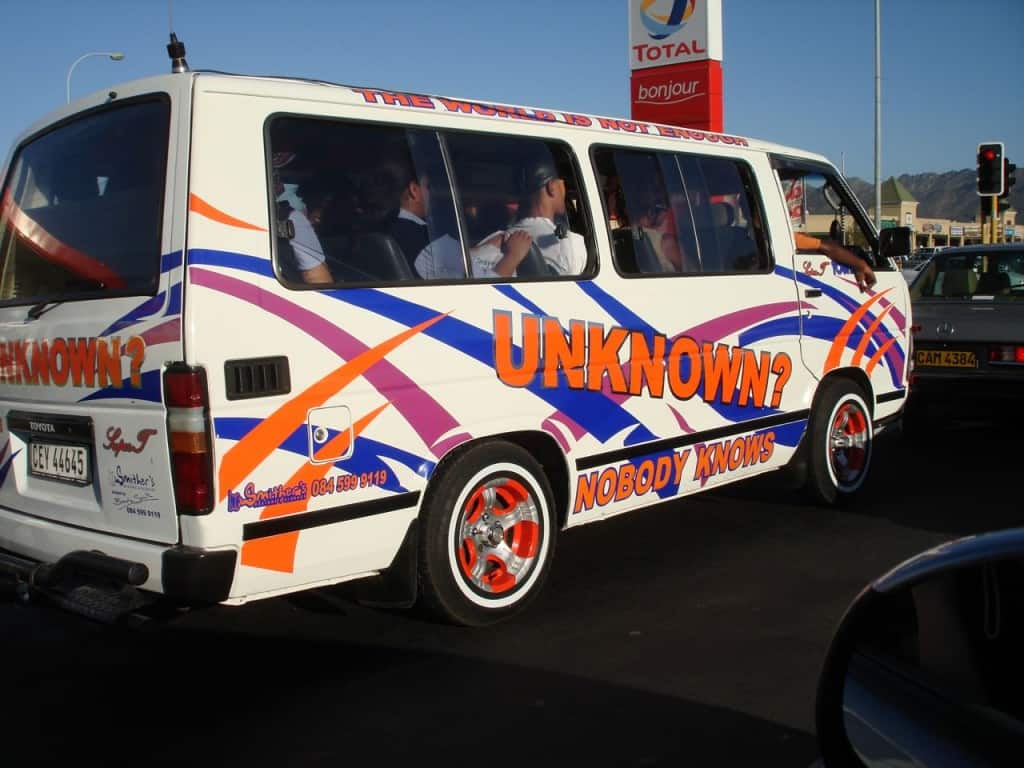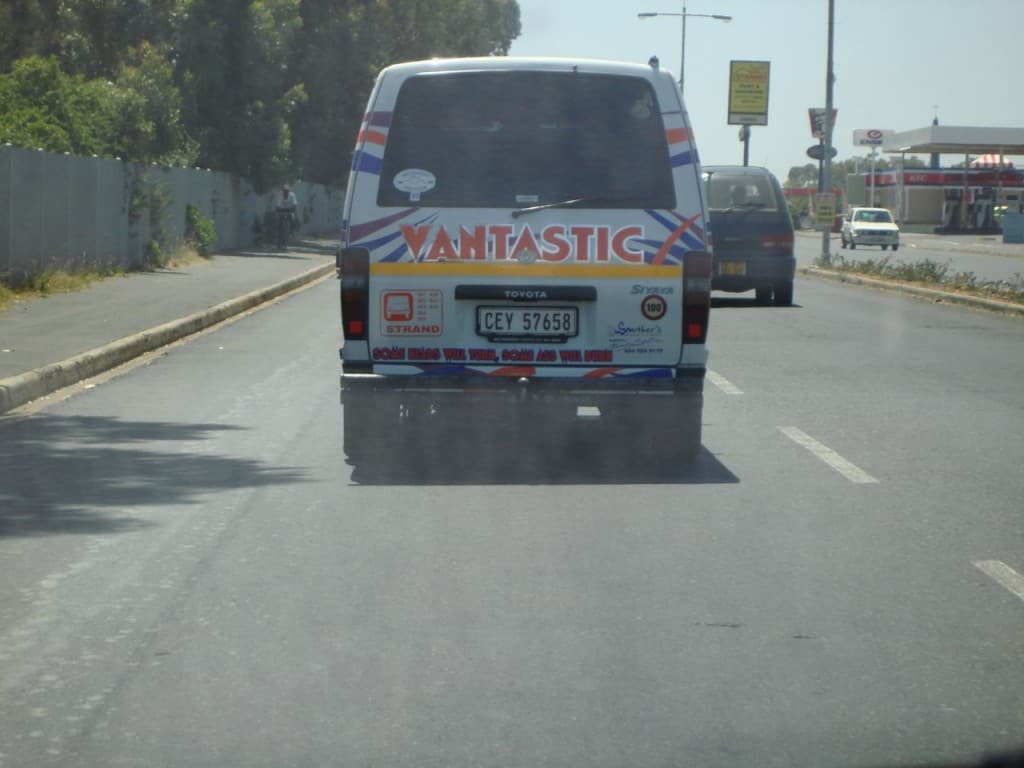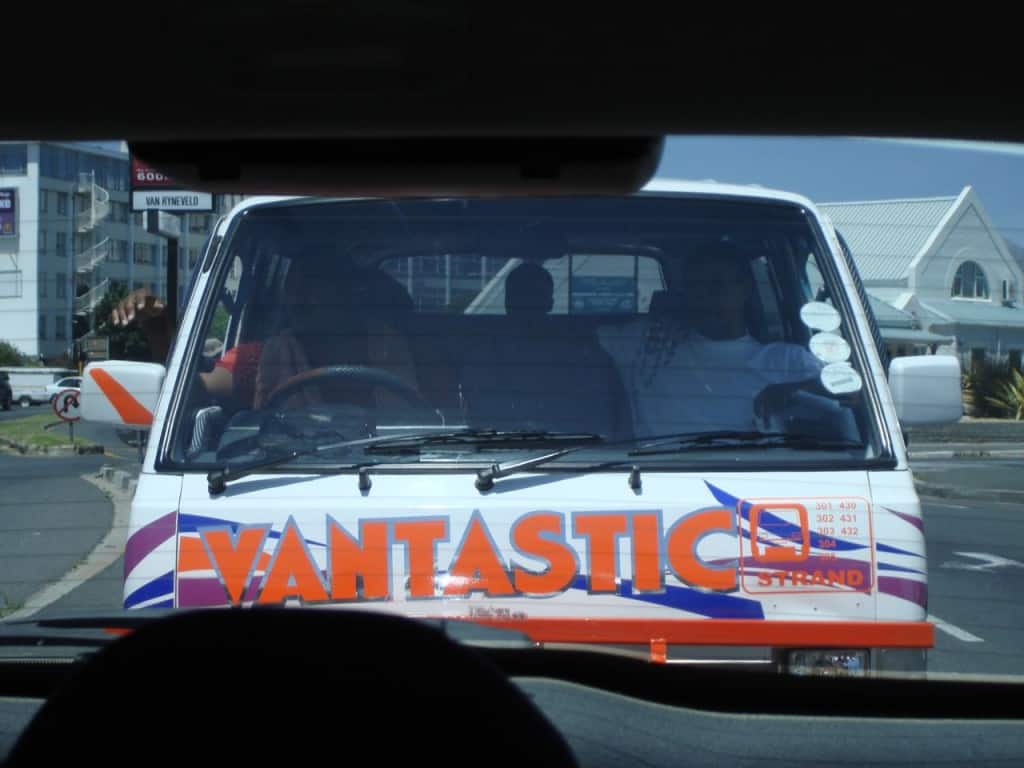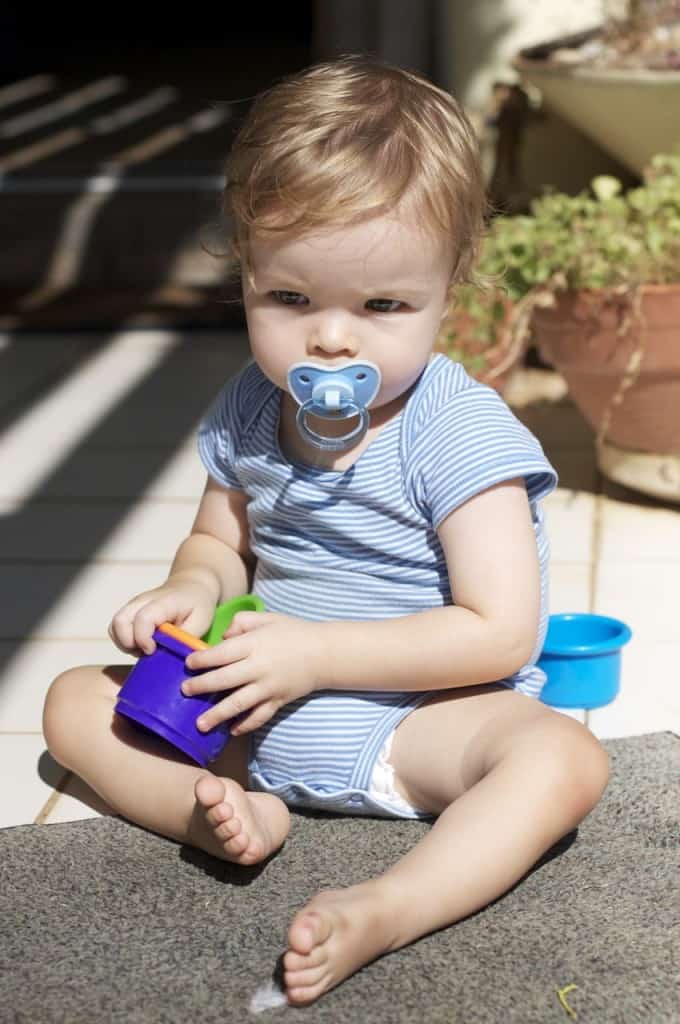Jan 5, 2010 | South Africa, Travel..ling Tuesdays
Hooray for another Tuesday! I am sorry I’ve been off the blogging circuit for a few days, but my guess is unless the Bear is your grandchild, you probably weren’t too terribly disappointed! This TT I thought you might enjoy a few everyday sights around town…namely the sassy African taxis that we are enjoying spotting whilst Mr. Potato Head is toting us hither and thither. I apologise in advance that these shots aren’t as crisp and artistic as others you may have been enjoying around here, but they were mostly taken through car windows with my little digital camera, since that lives in the nappy (diaper) bag so as to be readily available for such sightings.
It seems like we always see this one on the road. The name choice…I cannot explain.

This next one has pretty colours, but I can’t remember what the name is on the front. It might not be English.

“Good Luck to Those Who Hate Me” — I wonder if he is being generous and serious or sarcastic. It is a nice thought if he’s sincere!
This one is one of our favourites. It looks a lot like Unknown, but the name is much more creative. You might overhear me saying, “Look, Mark! There’s …

We wonder if the driver is vantastic, too?

There’s another one we always laugh and point at called Facebook. And the logos all over it actually look like the Facebook logo. I really wish I could’ve gotten a picture the last time we saw it. If I snap it later I will upload it for you!
And, just in case you’re missing a bit of pretty scenery from around here, here’s a shot (still sticking with the little digital camera) from our neighbourhood when we were out walking with the Bear one evening.

From Gordon’s Bay, you’re looking toward Cape Point, across False Bay. Not a bad view to come home to!
Although all has been a bit quiet on the blogging front for the last few days, I have some really lovely thoughts that I hope will encourage (and perhaps even challenge!?!) you in the days ahead. We’ve been settling in after our time away in Bloemfontein so I haven’t had a chance to type it all out! Until then, many blessings and happy trails!!
Dec 26, 2009 | Stories, The Good Word
This might happen to you. Maybe not exactly the way it happened to me. But I want to write you to prepare you. Because there are things you were put on this earth to do. And I think you have an enemy who would like it very much if you didn’t succeed in doing them.
Let me set the stage for you. We’ve sat down at a coffee shop with a friend from ages… and I do mean ages ago. More like an acquaintance who we’ve run into a couple of times in the past few years, and then planned to connect with again. The conversation starts off as normal as any other and then you’re hit with this brick: “Yeah, I don’t really like America. I don’t really like Americans, either.†And you…yeah, you, with the slightly ugh, what? look on your face… you are the American at the table.
You might follow up with, “Have you ever been to America?†That was my next step. And the reply was “No, but I met these three Americans in London and…â€

This Scottish-African-American has options.
It’s a little tough to swallow. I mean…there are times when it’s hard not to take something personally. Like why does anyone ever start a sentence with, “No offense, but…” Does that give you an excuse to say something offensive, just because you started a sentence with “No offense”? Anyway, a few of you might be surprised to know that this isn’t the first time this has happened to me. I’ve actually experienced it a lot. (I still love you, Rob!) Like, I mean I’ve experienced having to leave the room because I am crying because of the comments someone is making, to me, directly, that are hard to “not take personally.”
Now here’s where I really don’t want to lose you. This is the important part. Blinking lights here: Opinions don’t matter. Baseball vs. Cricket, Football vs. Rugby, Beyonce’s sparkling solo career, George W. Bush, your home country, the fact that nobody looks good in paisley… you can talk about these things, and lots of people will have different opinions. They just don’t matter.
I have been drawn in before. Definitely. Drawn into a conversation with a stranger or a friend where we could have had the opportunity to talk about something more important that George W. Bush or American foreign policy, or the British and colonization. I can remember it happening even when I lived in the States and spent a lot of time with international students. I’ve very often missed the opportunity to talk about the needful things…the important things…the eternal things because I took offense and felt the need to defend a presidential slipup or to explain which country actually started the use of concentration camps in war. Don’t get me wrong. I do think some of these conversations have a place and a time. But I don’t want you to get distracted from the really important conversations that you might only have one opportunity to have.
So as I sat across the coffee table and thought about the follow up to that last sentence, I consciously made the decision that we had more important things to talk about. And when the mention of George W. Bush came up, it was as if the enemy was directly poking me with a stick and trying to incite me to react, to speak up…to fight! But, glory be to God, I held my tongue. Fortunately Mark was able to hold his too — he has been a defender of the States since long before we met! As a result of us not getting drawn in, we had a really, really fruitful conversation, and we had the opportunity to talk about things eternal. What the Bible has to say about certain issues. How it is interpreted in different ways. What it means for us to believe it. Why the free will God has given us is so incredibly beautiful. And why we shouldn’t stop looking for the Truth.
As we walked away from that conversation, we reflected on how different it would’ve been if we’d taken the bait and gotten drawn into any of those other conversation options. I’m pretty sure they would’ve turned into arguments and borne bad fruit. Thankfully, after four and half years away from my home country, I’m at a place where you can say what you like about the good ol’ US of A… perhaps even my home state… and most of the time, it’s water off a duck’s back. Now my hometown might be a different story… 😉 But if we spend more time thinking about what’s really important… we might be able to hold our tongue about other things that just don’t matter.
The Sermon in a Nutshell: It’s not important for people to believe the Gospel according to George W. Bush. It is important for us to make the most of every opportunity to share the hope that we have. Don’t be ignorant of the enemy’s devices and get drawn into the wrong fight!
Nov 7, 2009 | South Africa, Stories
After moving into our new place, we had a couple of minor issues that needed the attention of an electrician and a handyman. Fortunately, our letting agency sent over a nice gentleman who is both. He sorted out a broken light socket in the kitchen, and the next week was sent over again to work on the issue that the doors onto our balcony might be blown in at any moment. The southeaster, she was a blowin’.
We discovered in conversation that this gentleman is not just a handyman of note, he is also a Christian. On top of that lovely discovery, he shared about the way the Lord radically changed his life when he repented and came to faith, and his excellent story includes starting a church in a township nearby. Bonus! He was planning to visit the church in the township the following Sunday and we asked if we could come along. Or we may have been invited, I can’t remember.
At any rate.

Photo by Randy OHC @ flickr
We thought we might be able to organise a shoe distribution with the help of this church, perhaps in the not-too-distant future. And hey, we’re looking for a church to call home, why not explore all the possibilities? This was obviously the beginning of a bit of adventure for a small town gal from Washington, North Carolina.
I am not sure I can accurately describe my experience of briefly passing through the township to attend church there. It is like life is just unceasingly happening — you never know what you’re going to see next, and you might be surprised to find that the people who live there are just surprised as you. As Mr. Potato Head grumbled along through the dusty streets, we saw sights we expected: Mamas with their babies strapped to their backs with bath towels or blankets, people carrying heavy things on their heads, lots of children everywhere. We also saw the unexpected: seven or eight men had picked an entire shack up over their heads, and were moving it casually down a hill to whoknowswhere. Things were so crowded I wondered where they would find a place to set it down. I also wondered if this was an everyday occurrence, but when I saw other people watching and pointing with bewildered laughs and stares, I decided I was fortunate enough to witness something very special. People were dressed up for church and heading in the opposite direction so I wondered if we’d chosen the right church to visit! We kept following our handyman friend in the bakkie (truck) in front of us.
A few moments later, we found ourselves inside a small church building, cinder block, tin roof and plastic chairs. Most of the men sat on one side and women on the other, but we’d already been seated before we noticed. (Not that we would’ve moved.) The pastor was still sharing the Sunday School Teaching, about fasting, and in my ignorance for a moment I marveled at the encouragement that people who might not have a lot to eat should fast. We’d sat near the back where there were plenty of chairs, and we took up lots of space, four adults and the Bear. As the church filled up and filled up we gradually scooted together and were cozy and hot by the end of our time there.
The very enthusiastic worship was in a language I didn’t know. Most of the congregation are immigrants from Zimbabwe, so we’ve concluded it may have been Shona. (Unfortunately I didn’t have the words on a screen to try my best with this time!) These folks moved to South Africa in hopes of opportunities for a better life. I don’t know whether they feel like they’ve found what they’re looking for. They faced severe brutality recently during the xenophobia attacks that swept across SA. Our handyman friend provided refuge for dozens of people — they slept in his home and shed and garage during the crisis. Many of them now no longer stay in this township, since they left when things were dangerous, but they return for church week after week.
The enthusiasm the people showed for the things of God was inspiring. Sometimes people have different ways of doing things and it is hard for an outsider to look on without being critical. Pledges for the building fund were being shouted out, and people were clapping for those making their pledges. I found myself walking the tightrope of trying to stay above being critical during this bit…but I remembered some lessons from my international studies classes, and the conclusion I often came to, that it is really difficult for anyone who is not a part of a culture to accurately perceive it, because we are all wearing our own cultural lenses. And I suppose when churches back in the States have building fundraisers, those who give a lot often receive praise in one way or another.
The church had had an all-night prayer meeting the night before, and had gone home for an hour or two of sleep, to get something to eat, and then return for Sunday school. I wasn’t sure I could convince the Bear to behave long enough for us to stay through the service…and I admired the stamina of these folks, who didn’t look at all tired to me as they danced and sang and worshiped the Lord. I think I could learn a lot if I stuck around for a while.
Our handyman friend encouraged us to head out after we’d shared about our work with Samaritan’s Feet and Mark brought a word of encouragement to the church. I stood on stage beside him with the Bear and was embarrassed at how wiggly and wild he was being. If your kid’s used to a schedule… As we stood outside and said a few goodbyes before following our handyman friend out, one little girl came over for a hug. I picked her up and gave her a hug and a kiss, and my heart just pined with compassion that I am not sure how to channel.
As I reflect on the time I’ve spent with ‘the poor,’ in Zambia, in Mexico, and here in South Africa, I am constantly amazed at the joy and contentedness I see in so many faces. Obviously I am not speaking about those in abject poverty, or trying to ‘romanticise’ it — but those living in ways that ‘Westerners’ might consider ‘poor’ often have a remarkable joy. Perhaps it is because a lot of the ‘poor’ I’ve spent time with are Christians. It challenged me to remember something I heard recently: if you have more than 5 shirts in your closet, you are probably better off than 90% of the world’s population. (I can’t confirm this and am not sure I’m remembering it correctly!) But the point is — if you have clothes to wear, food to eat, and a place to live, you have a lot to be thankful for.
We drove out of the township and got some lunch at a nearby shopping mall, which kind of made my head spin. From poverty to wealth in 3 miles flat. There is so much more to say, that is difficult to put into words. Mother Teresa once said,
“In this life we cannot do great things. We can only do small things with great love.â€
The opportunities to do small things with great love are where I am, and where you are. Even if it’s just for one person, I look forward to making a difference.
Oct 9, 2009 | Stories, The Good Word
One of my professors at the University of Edinburgh talked a lot about the significance of the narrative of the salmon. He thought it was sad that farm-raised salmon never get the chance to experience the narrative of the wild salmon — the true story of their destiny. Whether or not you would like to call it a narrative, the story of the salmon is really cool. There is actually a spot in Scotland where you can see them jumping up a waterfall and trying to make it upstream to spawn. While the story might be a complete nightmare if you have a lisp…it’s still a great stowy! You see, while most fish tend to go with the flow, the salmon start making their move upriver in the fall of the year, and when they feel they’ve found a good spot, they’ll lay their eggs. Often, they’ve gotten themselves so far upstream that by the time they’ve finished spawning, they’re in a high eddy where they can’t exactly get back downstream again. So they die there, but as their bodies decompose, they make the water extra-nourishing for the little eggy salmon waiting to be hatched. Their eggs are (hopefully mostly) safely kept there until it’s time to hatch, when they instinctively will begin the journey downstream to some more spacious waters, and the cycle will start over again.
There’s a beautiful spot at the Hermitage in Dunkeld where you can watch the salmon jump, and Mark took me there once a few years ago. It was amazing to see the fish trying to make it up this gushing waterfall, where they would honestly have to do a triple jump to make it to the top. Â I don’t think I ever saw one make it, but it was really entertaining to watch them try! Ooooh he almost made it! Ouch that one just faceplanted into a rock! But the fact that they have that amazing story, which as far as I know is unlike any other, makes them unique and special, and maybe even extra tasty.
The story of the Woman at the Well is similar — and yesterday’s blog (heck, a thousand blogs) couldn’t fully cover it. Something else that was really significant about the story was that Jesus was totally swimming upstream throughout His interactions with the Samaritan woman. In His day, it was not common for Jews to speak to Samaritans — they didn’t even want to go near them. Instead of treating the Samaritans like fellow human beings, they treated them like the red-headed stepchildren of the faith — they thought they needed to be treated like rubbish and totally ostracized. The Jews and Samaritans were constantly squabbling and bickering. Many a Jew in Jesus’ day would rather die of thirst than ask a Samaritan … especially a woman .. and one of questionable character at that, to draw a drink of water.
There’s probably not a lot to be surprised about in her response — “Um…like…aren’t you a Jew? So…ugh…why are you asking me for water? You guys don’t normally even want to be seen on the same hillside as us.” Jesus told her that if she knew with whom she was speaking, she would be asking Him for a drink of living water. She liked that idea, until Jesus suggested that she bring her husband and come back. She tries to skirt her ‘issues’ by simply saying she doesn’t have a husband. Jesus reads her mail and says, “Yeah…you’ve already had five, and you’re not even married to the guy you’re with now.”
Instead of outright telling Jesus to get our of her sauce, she just changes the subject, by bringing up part of the argument that has been going on between the Jews and Samaritans for ages. But once again, Jesus is not caught up in the cultural dilemmas of the day. Here’s how Matthew Henry puts it:
Jesus did not try to convince her of her schismatical belief system’s faults, but her conversion came about because He showed her her own ignorance and immoralities, and her need of a Saviour.
Although there are a thousand sermons to be preached on this simple interaction, here’s the place I’m headed: Jesus was not caught up in the cultural customs of His day. And that meant He was free to engage anyone He wanted, anywhere He wanted — Jew or Samaritan, Mute or Leper, Tax Collector or Prostitute. What does that say for us? It says to me — pay attention to where the customs of your culture might take you. Those customs might lead you in a different direction, and on a different path from the one the Lord would have you take. Has your culture made you think the best place for a woman is in the home? Has your culture made you believe that people of a different ethnicity are incapable or intellectually inferior? Have the common customs of your locale made you think there are places you shouldn’t go or people you shouldn’t help? And more significant, has your culture perhaps convinced you that you don’t actually have to make Jesus your Lord, and you can still call yourself a Christian?
We should constantly challenge our ways of thinking in light of the Truth of the Gospel. The Truth is, we could perhaps consider ourselves salmon. And our true destiny is to live, contrary to our nature, in the call of God. Our true destiny is to swim upstream, and live, not according to our sinful nature, but according to the leading of the Holy Spirit, in obedience to God. And a life lived to God is a life lived upstream. If you are living in obedience to God, it is not likely that you will be doing the same thing as everyone around you. It is likely that the walk God has for you will be more of a challenge than a lazy afternoon ride on a raft headed with the current of the little stream He’s placed you in.
The cross is a heavy object. Carrying it is likely to bring you to places of resistance — places where it is difficult to lift this heavy object and bring it with you — places where it would be easier to turn back, to put it down, or to keep walking without it. Â If you should decide to put it down, to go with the current, and to keep on as you always were, you might still be swimming, but you’ll be swimming in nets on the farm…and you’ll never brave the open waters to live out the story God has for you.
Take an opportunity to swim upstream today. And please let me know how it goes.
Oct 7, 2009 | South Africa, Stories, Top Ten Lists
Top of the Week to ya! Since lots of folks seemed interested in my last post about South Africa, I decided to write another SA post…perhaps for those of you planning to be here for the World Cup next year! This amazing country is a melting pot of cultures, languages and of course, some delightful idiomatic expressions…which are my favourite things to learn, in any language. If you’ll be here for a visit anytime soon, here is my guess at the top ten most important words for you to learn, which might not be native to your version of English. Now mind you, I am not a South African, but married one, so I must give the disclaimer of saying these are second-hand understandings, with some first-hand opinions added in.
If you want to speak South African, this is a good place to start:
10. Robot – you might picture a metal box of arms and legs that can dance or run the Hoover for you (a la Rosie on the Jetsons), but in South Africa, a robot is a traffic light.
9. Gatvol – Pronounced HUT-vul, when you’ve “had it up to here” or are past the point of being incredibly frustrated, you are “gatvol.” Eish, by the end of that rugby match, I was gatvol with the Cheetahs. Maybe next season, hey?
8. Bro or bru – An abbreviated term for brother which rhymes with “row” or “chew.” Hey bru, it was a lekker party last night.
7. Eish – This term sounds like ‘ace’ with an ‘h’ on the end. It means ‘wow.’ It’s sometimes used in sticky situations:Â Eish, bru, I’m sorry. I didn’t even know it was your birthday.
6. Eina – Ouch! Or when something is sore. This is a long ‘a’ sound, followed by a ‘nah’. Might be used instead of a southern ‘dern’ when one stumps one’s toe.
5. Jislaaik – This one is pronounced “Yis-like” and means “gee” or “wow.” It’s a useful exclamation for when something is surprising. Jislaaik, those are tight jeans. She must’ve jumped into them from the top of the cupboard.
4. Boerewors – This tasty treat is literally translated from Afrikaans, farmer’s sausage, ‘Boere’ meaning farmers, and ‘wors,’ sausage. It’s pronounced (at my best attempt) “boo-re-vors” with a bit of a trill on the first r. It should be comprised of mostly minced beef, and is sometimes mixed with a bit of pork or lamb. No braai is complete without it! (See Number One).
3. Howzit? This lovely and useful term is simply “How’s it going?” but nicely abbreviated. You can imagine it like a South African Joey from Friends saying, “Howzit, Rachel?”
2. Lekker – You can’t visit South Africa and not hear this term a few times. If something is lekker, it’s nice or good, depending on the context. (Lekker is pronounced kind of like ‘lacquer’ as in the stuff you might coat wood with.) Eish, it was a lekker party until she showed up in her tight jeans. Then we were gatvol and left.
1. Braai — rhyming with “try,” this is perhaps the most important word in the South African English Language. It’s both a noun and a verb. You might call it a barbecue, or “grilling out.” The pastime of the braai is an incredible art — many South Africans are choosy about what type of wood they use, others might use charcoal or briquettes or (less often I suppose) a gas braai. The timing of putting on the meat, the heat and size of the fire, and the amount of wind you might be dealing with are all factors to consider which can make or break the perfect braai. And from my experience so far, a true South African will always say the braai they’re enjoying could’ve been just a little better if they’d just …
I highly suggest coming to South Africa for the World Cup next year, or just for a visit any time! So howzit, bru? Come enjoy some bakgat boerewors at a lekker braai or two! You’ll pass through a few robots, and be here just now, hey? Eish, the trip might be eina, but you’ll be gatvol if you don’t.
Here are a few extra tips for good measure:
- Avie is slang for afternoon, pronounced “AH-vee”
- Bakgat -Â this is an Afrikaans word used fairly often by English speakers. Pronounced “BAHK-hut” with a nice thick ‘hhh’ on the hut. Bakgat means ‘fantastic.’
- Lots of folks, especially from Johannesburg (also known as Jozi or Joburg), will end their sentences with “hey?” Warning: this can rub off on you VERY quickly. (I picked up this habit when I lived in Scotland and had a roommate from Southern Africa!)
- Ja – pronounced “Yah” is a common way of saying yes, and people will often start or finish sentences with it.
- Alternatively, people more often begin their sentences with “No…” in answer to a question, even if “no” isn’t actually the answer to the question, and even if the question is not a yes or no question. So keep listening until you get the whole answer!
- If you’re teasing the person in the centre by not giving them the ball, you’re playing “piggy” (not monkey) in the middle.
Here’s another great site where you can learn to “speak South African” in preparation for your visit!
xCC








 I create resources to help people find deeper, more meaningful relationships with God through pursuing, pondering, and prayer. The "Shop" link above will take you to the home of many of the lovely resources I’ve created to help you keep walking one day deeper with Jesus.
I create resources to help people find deeper, more meaningful relationships with God through pursuing, pondering, and prayer. The "Shop" link above will take you to the home of many of the lovely resources I’ve created to help you keep walking one day deeper with Jesus.